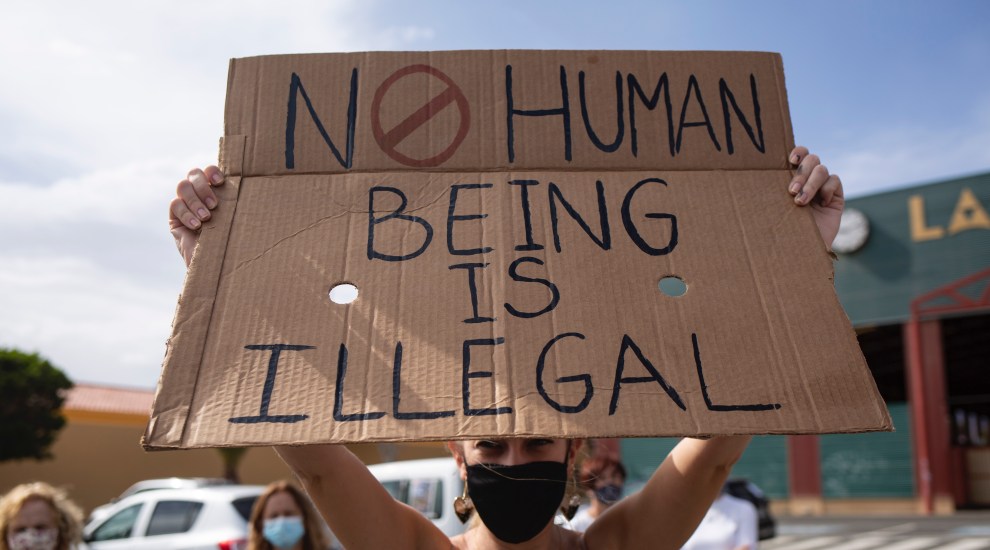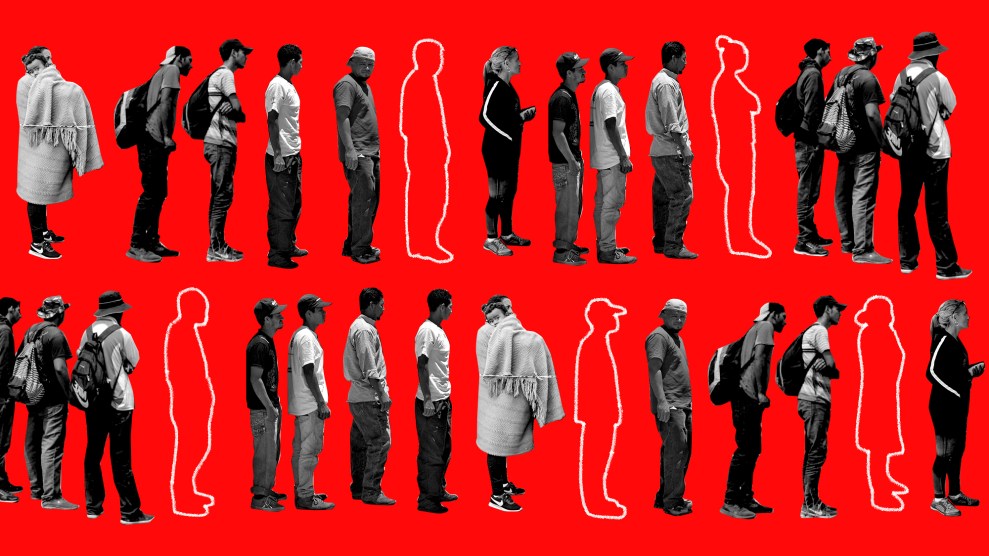
Mother Jones illustration; Getty; Wikipedia
Creating a TikTok account falls into the category of things Norma Sepulveda wouldn’t have done before the pandemic. She thought of it as one of the “silly things” kids like her teenage son do, and Sepulveda’s job is anything but silly.
As an immigration attorney in the Rio Grande Valley of Texas, she works on deportation defense and complex cases that intersect with the criminal justice system. Over more than 10 years of practice, Sepulveda has helped countless families obtain visas and green cards and has had to tell many more that a set of arbitrary circumstances prevented them from gaining legal status in the United States. “Nobody ever wants to hear that,” Sepulveda says. So she found it odd when some of those past clients started reaching out to her late last year saying they had seen ads on TikTok for easy ways to fix their status. “I didn’t know if it was just that they had misunderstood it or if there were lawyers providing information that was giving them false hope,” she says.
Sepulveda joined TikTok after Christmas to find that besides viral nail artists, beekeepers, and BookTokers, the platform had become fertile ground for another brand of content creators: immigration lawyers like herself. At a time when consultations had moved online and lawyers had to be more creative about reaching potential clients, TikTok proved a fruitful marketing tool. But it has also stirred up debates among attorneys about the ethical boundaries of social media advertising, prompting what many believe to be an overdue reckoning with the power imbalances and conflicting incentives—profit and the public interest—inherent to the practice.
TikTok’s ecosystem of immigration lawyers is a diverse one. There are plenty of zealous advocates attempting to explain in digestible sound bites convoluted, ever-changing policies. There is also potentially misleading content. Many of the advertisements seem to target undocumented Latin American immigrants with strong ties to the United States and few to no existing options for obtaining legal status.
Generally speaking, immigrants who enter the country illegally, overstay a visa, or have certain criminal convictions or prior deportation orders can be disqualified from applying for a green card within the United States even if they are eligible through a spouse or children with citizenship or permanent residency. Instead, they often must go abroad and apply for a green card from a foreign consulate, sometimes after staying out of the country for a mandated period that can be as long as 10 years. This unforgiving feature of the archaic immigration system, which President Joe Biden’s immigration reform proposal would eliminate, forces many people to choose between leaving their families and staying undocumented. It also creates opportunities for unlicensed legal consultants known as notarios and some lawyers to cash in on a vulnerable population.
It’s this population that the TikTok ads primarily target.
“It just goes to the heart of the problem with immigration to begin with, that there’s very few ways to help these people,” says Laureen Anderson-Stepanek, a Chicago-based immigration lawyer.
The TikTok posts usually follow a simple formula: With a mariachi song or reggaeton beat playing in the background, the lawyer dances and flashes work permits, while popup boxes urge the viewer to schedule a legal consultation. They also often carry the hashtag #arreglarsinsalir, or “fix without leaving,” implying that viewers can obtain legal status without having to go to an embassy or consulate abroad. The hashtag has topped 1 million views.
In many cases, the ads, often bilingual, guarantee an employment authorization in six months and a green card within two years, even if, as several ads say, “other attorneys have said you have no option.” Alluding to the competition’s unwillingness or inability to “win a difficult case” is a go-to selling point, as is the catchphrase “You deserve your papers.” The message behind the 15- to 60-second videos is clear: Whatever the immigration problem might be, there’s a solution. But if you’re not familiar with the ins and outs of immigration law, it would be hard to tell exactly what is being advertised.
The silver bullet these ads are hawking is a class of humanitarian visas and benefits for immigrant survivors of domestic violence, as well as certain other crimes and human trafficking in the United States. These generous protections can lead to a work authorization and make it possible to obtain a green card without leaving the country (“arreglar sin salir”), either because penalties for unlawful presence don’t apply or because they can be more easily waived. But many of the TikTok videos by lawyers with tens of thousands of followers fail to name the visas or explain basic requirements, such as having experienced “battery or extreme cruelty” at the hands of a spouse, child, or parent or “substantial mental or physical abuse.” Euphemisms and veiled references to abuse—”experiencing marital problems” and “being disrespected by a toxic partner”—abound, alongside decontextualized questions such as “are you separated from your citizen or permanent resident spouse?” and “does your child have problems with addiction?”
Some videos are more explicit about the nature and conditions of the forms of immigration relief being promoted but have a jarringly upbeat tone to them, despite the seriousness of the underlying issue. Many are cringeworthy, like one post advertising a visa for victims of human trafficking, which can include forced labor, showing a lawyer casually posing next to a bulldozer with hashtags like #trabajo and #construction. Less visible, in tiny letters, is the disclaimer: “not legal advice, each case needs a consultation.”
“I worry about any promises or things that look like promises,” says Alison Kamhi, a San Francisco supervising attorney with the Immigrant Legal Resource Center, a national organization that provides legal assistance and training to lawyers. “It’s hard to tell what a person qualifies for or not until you meet them. It’s not one size fits all.”
@abogadaangela ¡Estamos ganando para nuestros clientes! ☎️615-454-2502 #win#gana#inmigranteslatinos #abogadaangela #arreglarsinsalir #hispanic #permisodetrabajo
I spoke to several immigration lawyers, some of whom are TikTok users, who expressed mixed feelings about this marketing trend. (“Abogada Angela,” featured in the video above, didn’t respond to a request for comment.) They shared reservations about the lack of transparency and withholding of critical information that would allow immigrants to make better-informed decisions. But many were also careful to point out that without concrete evidence of fraud and malpractice, the appropriateness of the TikTok videos is a matter of personal ethics and style, not legality. (“I don’t have the confidence to do that,” one lawyer said about playing around with work permits, while another said “there’s something sacred about [practicing law] that makes me not feel like being goofy and silly to capture people’s attention.”)
The strategy, one attorney told me, is “to essentially market enough that you get people in the door”—which means collecting fees for initial consultations. (Lawyers often charge $100 or more for a 30-minute phone or video call.) That doesn’t mean clients aren’t ultimately receiving adequate legal counseling or that the system is being abused. Maybe casting a wide net allows these lawyers to find potential clients with legitimate claims who, for one reason or another, wouldn’t self-identify or come forward as a survivor. On the other hand, it might encourage a “self-fulfilling prophecy,” Anderson-Stepanek says, whereby people feel compelled to try to meet the requirements by exaggerating or embellishing their stories and, without knowledge of the consequences, submit frivolous cases they can’t be sure of winning. In the long run, that could jeopardize their path to legal status and make government agencies more skeptical of legitimate claims.
“These are clients who have heard so many times that nobody can help them and they really are desperate,” says Katja Hedding, an immigration lawyer in Murfreesboro, Tennessee. “The problem is, I don’t think all of them realize what they’re filing.”
Since May, Hedding says, she has lost track of how many clients have come into her office and said they’d been told they could adjust their status without leaving the country. In one case, a couple had signed a retainer agreement and paid thousands of dollars to a lawyer who had promised that the undocumented husband could get a work permit despite his deportation order. Even though they had never mentioned domestic violence, the attorney had put together a case for him for a visa designed for abused spouses. The couple didn’t move forward with it, nor did they feel comfortable filing a bar complaint against the attorney. This account was not unlike the ones Sepulveda heard from clients who had sought a second opinion from her after being asked by other attorneys about a rebellious son or a jealous partner and promised they could get their immigration status fixed. “I can see how people who maybe have not consulted with a lawyer before would fall for something like that,” Sepulveda says.
Ashley Arcidiacono, an immigration lawyer practicing in California who goes by Abogada Ashley on TikTok, said in an email that she screens potential clients for all available options, even if not everyone will qualify to fix their status without leaving the country. “My goal with marketing on TikTok is to educate viewers by letting them know different possibilities exist and to tell them to call for a consultation,” she said.
With 87,000 followers, Texas-based attorney Vanessa R. Alonso said she hopes her “funny, lighthearted” videos “conjure up positive emotions” about immigration. Alonso said she looks for both “obscure and very general forms of relief” to see if clients fit into any boxes. She also prefers to use language like “toxic” relationships rather than “domestic violence” in her posts as a way to invite people, particularly men who might not want to be perceived as victims, to “have these difficult conversations.” In her experience, clients will often open up about suffering abuse at home. “Every attorney should be asking these questions and looking for all these forms of relief,” Alonso said. Those who aren’t, she added, are “not zealously advocating for their clients.”
@abogadaalonso Llámenos para ver si califica 1-855-663-4763 tomando casos de tu estado también. #latinos #toxica #mexico #parati #universalstudios #fyp #univision
Rules governing lawyers’ professional conduct and ethics vary by state, but when it comes to advertising, they reflect a guiding principle set forth by the American Bar Association that “a lawyer shall not make a false or misleading communication” by misrepresenting or omitting facts. In some states, a legal ethics committee also issues non-binding advisory opinions that specifically address social media use, often pointing back to the general advertising rules. The American Immigration Lawyers Association provides information about social media and legal ethics through seminars and published articles “to make sure members understand how the rules are interpreted and make sure they now where the line is,” says Reid Trautz, the director of the association’s Practice and Professionalism Center. “We want our members to stay back from the line.” Trautz said the association is currently revising its ethics manual to include updated guidance on state-specific rules for advertising messages from an immigration lawyer’s perspective and working on at least one article related to social media marketing. “If there’s a question that the advertising is misleading, that can not only hurt the consumer but have an impact on the bar as well,” he says.
On TikTok, Twitter, and elsewhere, some immigration lawyers have started raising red flags about trends like arreglar sin salir. “We have a responsibility to do our best and keep each other accountable because the system often won’t,” says Lily Axelrod, an immigration lawyer who recently appeared in a YouTube video debunking assurances that seem too good to be true. “Especially those of us working with survivors who have often been controlled and kept in the dark. And part of the role of the attorney is to make sure that you’re not replicating that dynamic.”
Three months after she joined TikTok, Sepulveda now has more than 155,000 followers. On her daily videos, she answers questions about immigration issues in the news. She has also posted a three-part series explaining visas for survivors of domestic violence and who qualifies for them. Her goal, she says, is to strike the right balance between “entertaining and informative.”
@tximmigrationlawyer #VAWA (Violence Against Women Act) protects #immigrants who have been victims of abuse or extreme cruelty. #abogadanorma #immigrationlawyer
“I don’t do it mainly so that I can get more business,” she says. “There’s a lot of myths out there on how people are able to fix their status, and if I can do my part by explaining these different areas of the law so they are more informed when they schedule a consultation, I think that that’s helpful.”
This article has been updated to remove an embedded video.
















